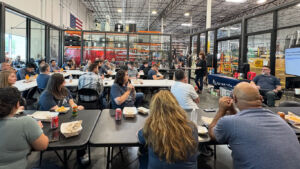Cox Communications and Arizona State University (ASU) announced at the 2019 ASU Smart Region Summit flagship event their partnership to create the Cox Connected Environments Collaboratory at ASU. This collaboration will drive the development of Arizona’s smart region infrastructure, delivering on the promise of ASU’s Smart City Cloud Innovation Center (CIC) to build smarter communities in the greater Phoenix metropolitan region by solving pressing community challenges.
The Cox Connected Environments Collaboratory at ASU will aim to solve real challenges within the Greater Phoenix community and beyond in ways that are innovative and not readily available in the marketplace today. As an incubation center and convening space, the Collaboratory aims to engage ASU students, staff, and faculty to design the next wave of Internet of Things (IoT) solutions that could, for example, optimize buildings for sustainability, provide new learning experiences in virtual and augmented reality, overhaul transportation infrastructure and more.
To power the Collaboratory, Cox will deploy a comprehensive wired and wireless network on campus as part of ASU’s NextGen Network. The Collaboratory is another step forward for these efforts, engaging city leaders and citizens, non-profits, faculty, student researchers, industry experts, and visiting scholars to build the metropolis and regional infrastructure of the future.
“Cox is a trusted partner, and we are eager to see the Cox Connected Environments Collaboratory at ASU drive smart region applications that combine people, connected devices, data and processes to improve community operations and the citizen experience,” said Lev Gonick, chief information officer, Arizona State University.
“Cox currently powers several smart city initiatives and communities today as the preferred data network of residents and business owners,” said Steve Rowley, executive vice president, Cox Business. “Cox Business, combined with Cox2M, will bring new experiential capabilities to the campus and provide a space for all to innovate.”
“Through our Cox2M business line, we will bring ASU students, staff and faculty the tools and capabilities to develop end-to-end solutions that can really make a difference,” said Sujata Gosalia, executive vice president and chief strategy officer, Cox Communications. “We are excited to build the future together in this new collaborative environment.”
As a founding partner of The Connective – Greater Phoenix Smart Region Consortium, Cox will also work with ASU to utilize the power of Cox’s existing gigabit network and continue to extend its fiber infrastructure through aggressive investment to create a more connected region.
The Cox Connected Environments Collaboratory will reside in an Innovation Zone at ASU, spaces located across the Valley and ASU campuses that are dedicated to creating innovative solutions to global challenges. These Zones include SkySong, ASU Research Park, Novus Innovation Corridor and more, actively engaging schools, faculty, students, programs and initiatives.
“The spirit of innovation permeates everything we do here at ASU, and that philosophy extends to the ecosystems and resources we make available to our collaborators,” said Sethuraman Panchanathan, executive vice president of Knowledge Enterprise and chief research and innovation officer at ASU. “New ideas and solutions to grand challenges are discovered when we partner at this level. Our Innovation Centers and Innovation Zones are prime examples of how these relationships are cultivated, and how the resulting benefits are realized by our communities.”
“On behalf of the executive team of the Greater Phoenix Connective, we are grateful to have Cox Communications as a Founding Partner. The new Cox Connected Environments Collaboratory at ASU will allow us to experiment with new applications and technologies that will enable the development of a smart and connected region enhancing the quality of life for the citizens and businesses of the Greater Phoenix Region”, said John Graham, Chairman of Partnership for Economic Innovation.




